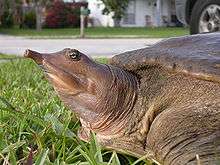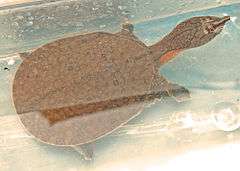Spiny softshell turtle
| Spiny softshell turtle | |
|---|---|
 | |
| Scientific classification | |
| Kingdom: | Animalia |
| Phylum: | Chordata |
| Subphylum: | Vertebrata |
| Class: | Reptilia |
| Order: | Testudines |
| Suborder: | Cryptodira |
| Family: | Trionychidae |
| Subfamily: | Trionychinae |
| Genus: | Apalone |
| Species: | A. spinifera |
| Binomial name | |
| Apalone spinifera (Lesueur, 1827)[1] | |
| Synonyms[2] | |
| |
The spiny softshell turtle (Apalone spinifera) is a species of softshell turtle, one of the largest freshwater turtle species in North America. Both the common name, spiny softshell, and the specific name, spinifera (spine-bearing), refer to the spiny, cone-like projections on the leading edge of the carapace, which are not scutes (scales).
Geographic range
The spiny softshell has a wide range, extending throughout much of the United States, as well as north into the Canadian provinces of Ontario and Quebec, and south into the Mexican states of Tamaulipas, Nuevo León, Coahuila and Chihuahua.[1]
Taxonomy
The species was first described by Charles Alexandre Lesueur in 1827.[1] It has been redescribed numerous times, leading to some confusion in its taxonomy.[3] The recognized subspecies differ in the markings on the carapace, on the sides of the head, and on the feet. However, these markings, which are distinct as hatchlings, fade as the turtles grow larger. Adult females of the various subspecies, which grow larger than males, are not easily distinguishable from one another, and sometimes can only be assigned to a particular subspecies based on geography.[4]
Reproduction
Spiny softshells begin mating between ages 8 and 10. A large female turtle may live up to 50 years. The turtles mate in mid-to-late spring in deep water. The male will nudge the female's head while swimming, and if she chooses to mate, the male will swim above the female without clasping her with his claws (unlike other turtles). A few months later, the female turtle quickly lays her eggs along a sunny sandbar or gravel bank in a flask-shaped cavity she has dug close to the water. The turtle nests more than once during a single season. She can lay between 9 and 38 round, calcareous-shelled eggs. The eggs are laid around August and September, and they hatch in the spring. Unlike in other turtles, in the spiny softshell turtle, the sex of the hatchlings is not determined by temperature variations; it is determined by genetics.[5]
Subspecies
Six subspecies of Apalone spinifera are recognized, including the nominate subspecies:[6]
- Northern spiny softshell turtle (or Eastern spiny softshell[7] ), A. s. spinifera (Lesueur, 1827)[1]
- Gulf Coast spiny softshell turtle, A. s. aspera (Agassiz, 1857)[1]
- Black spiny softshell turtle or Cuatro Cienegas softshell turtle, A. s. atra (Webb & Legler, 1960)[1]
- Texas spiny softshell turtle, A. s. emoryi (Agassiz, 1857)[1]
- Guadalupe spiny softshell turtle, A. s. guadalupensis (Webb, 1962)[1]
- Pallid spiny softshell turtle, A. s. pallida (Webb, 1962)[1]
A previously recognized subspecies, Apalone spinifera hartwegi (Conant & Goin, 1941), has been synonymized to A. s. spinifera as of 2011.[1]
Genomics
A rough draft assembly of the A. spinifera aspera genome was completed in 2013 by The Genome Institute at Washington University - St. Louis. The assembly ASM38561v1 can be accessed via its Genbank accession ID APJP00000000.1
Gallery
 A spiny softshell turtle.
A spiny softshell turtle. A spiny softshell turtle basking in the sun.
A spiny softshell turtle basking in the sun.
References
- 1 2 3 4 5 6 7 8 9 10 11 Rhodin 2011, p. 000.206.
- ↑ Fritz & Havaš 2007, pp. 306–310.
- ↑ California Turtle & Tortoise Club: Softshell Turtles.
- ↑ Conant R (1975). A Field Guide to Reptiles and Amphibians of Eastern and Central North America, Second Edition. Boston: Houghton Mifflin. 429 pp. (Softshell Turtles: Family Trionychidae, pp. 76-77).
- ↑ Greenbaum, Eli; Carr, John L. (2001). "Sexual Differentiation in the Spiny Softshell Turtle (Apalone spinifera), a Species With Genetic Sex Determination". Journal of Experimental Biology 290: 190-200.
- ↑ "Apalone spinifera". Integrated Taxonomic Information System. Retrieved 31 May 2012.
- ↑ Species Apalone spinifera at The Reptile Database .
- Bibliography
- Rhodin, Anders G.J.; van Dijk, Peter Paul; Iverson, John B.; Shaffer, H. Bradley; Bour, Roger (2011-12-31). "Turtles of the world, 2011 update: Annotated checklist of taxonomy, synonymy, distribution and conservation status". Chelonian Research Monographs. 5. Archived from the original (PDF) on 2012-01-22.
- Fritz, Uwe; Havaš, Peter (2007). "Checklist of Chelonians of the World". Vertebrate Zoology. 57 (2): 149–368. Archived from the original (PDF) on 2010-12-17.
Further reading
- Behler JL, King FW (1979). The Audubon Society Field Guide to North American Reptiles and Amphibians. New York: Alfred A. Knopf. 743 pp. ISBN 0-394-50824-6. (Trionyx spiniferus, pp. 485-486 + Plates 270, 271).
- Boulenger GA (1889). Catalogue of the Chelonians, Rhynchocephalians, and Crocodiles in the British Museum (Natural History). New Edition. London: Trustees of the British Museum (Natural History). (Taylor and Francis, printers). x + 311 pp. + Plates I-III. (Trionyx spinifer, pp. 259-260).
- Lesueur CA (1827). "Note sur deux espèces de tortues, du genre Trionyx de M[onsieur]. Geoffroy-Saint-Hilaire ". Mémoires du Muséum d'Histoire Naturelle, Paris 15: 257-268 + Plates 6-7. (Trionyx spiniferus, new species, pp. 258–263 + Plate 6). (in French).
- Smith HM, Brodie ED Jr (1982). Reptiles of North America: A Guide to Field Identification. New York: Golden Press. 240 pp. ISBN 0-307-13666-3. (Trionyx spiniferus, pp. 31-33).

